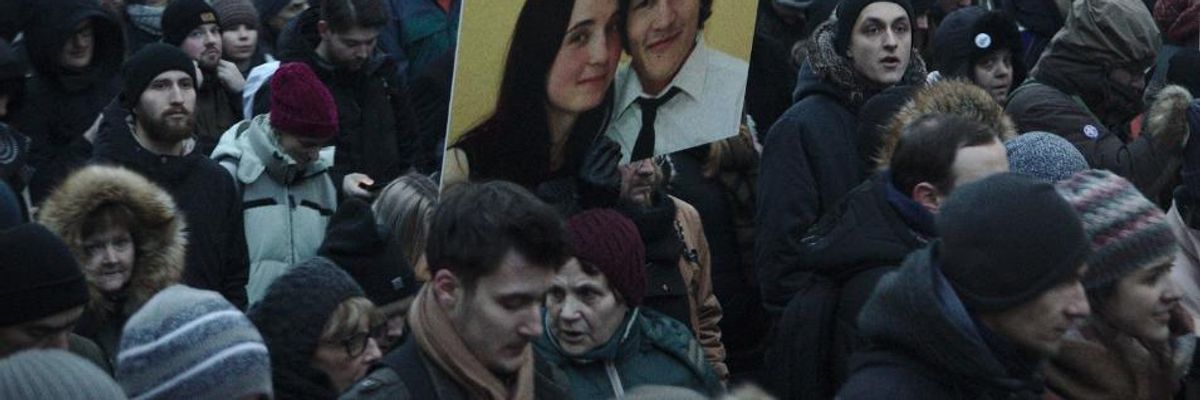The international press freedom group Reporters Without Borders detailed an "unprecedented" level of violence and hostility toward journalists around the world in 2018, with the number of reporters killed and detained while working--or in retaliation for their work--shooting up from the previous year.
Eighty journalists around the world were killed due to their reporting work from January to November 2018, while 348 were detained and 60 were held hostage, according to the the group's annual "Worldwide Round-up" of dangers faced by journalists.
"Violence against journalists has reached unprecedented levels this year, and the situation is now critical," said Christophe Deloire, head of Reporters Without Borders, which is also known by its French name, Reporters Sans Frontieres (RSF).
Afghanistan was named as the deadliest country for journalists, with 15 reporters killed in violent attacks--including nine who were killed in bombings claimed by ISIS in Kabul on April 30, which deliberately targeted journalists.
Eleven reporters were killed in Syria, including eight non-professional local journalists, who "play a fundamental role in the production of news and information in countries with oppressive regimes and countries at war, where it is hard for professional journalists to operate."
"The hatred of journalists that is voiced, and sometimes very openly proclaimed, by unscrupulous politicians, religious leaders and businessmen has tragic consequences on the ground, and has been reflected in this disturbing increase in violations against journalists." --Christophe Deloire, RSF
The killing of Jamal Khashoggi, a Washington Post columnist who had written critically about the government of his home country Saudi Arabia, provoked international outrage in October and drew worldwide attention to the U.S. role in the Saudi-led military campaign in Yemen.
Other journalists whose killings drew headlines around the world include Jan Kuciak, who was killed after reporting extensively on the Calabrian mafia in Slovakia, and Yaser Murtaja and Ahmed Abu Hussein, who were killed while reporting on Great March of Return demonstrations on the border between Gaza and Israel--despite identifying themselves as journalists.
Nearly half of reporters' deaths that were recorded by RSF occurred in countries that are not at war. The U.S. was named for the first time as one of the world's deadliest countries for journalists in 2018 after an attack at the offices of the Capital Gazette, a newspaper in Maryland. A man who had been harassing the paper about an article which named him opened fire in the newsroom, killing four journalists and another staff member.
The shooting took place amid escalating anti-press rhetoric from President Donald Trump and his administration. Numerous times in 2018, the president referred to the free press as "the enemy of the people," "dishonest, terrible people," and "bad for the country"--while top administration officials declined to refute the statements.
"The hatred of journalists that is voiced, and sometimes very openly proclaimed, by unscrupulous politicians, religious leaders and businessmen has tragic consequences on the ground, and has been reflected in this disturbing increase in violations against journalists," said Deloire.
RSF also highlighted journalists who have been detained for their reporting, including Kyaw Soe Oo and Wa Lone, two Reuters reporters who were sentenced to seven years in prison for violating Myanmar's Official Secrets Act, for their reporting on the state-sponsored massacre and persecution of Rohingya civilians.
China was again named the biggest jailer of journalists, imprisoning 60 reporters including 46 non-professionals--many of whom "are being held in often inhuman conditions for nothing more than a post on social networks or messaging services."
Along with continuing to fulfill its mission of monitoring abuses of journalists and providing legal assistance to reporters whose rights have been threatened, RSF has developed an initiative asking world leaders to sign a "Pledge on Information and Democracy."
The pledge "would establish the right to reliable news and information, define the global information and communication space as a common good of humankind, make online platforms accountable, and create an international group experts on information and democracy, with a function akin to the IPCC's role with regard to climate change."
Twelve countries responded to the appeal, and six heads of state attended a forum last month to discuss the need to protect freedom of the press in their countries.

